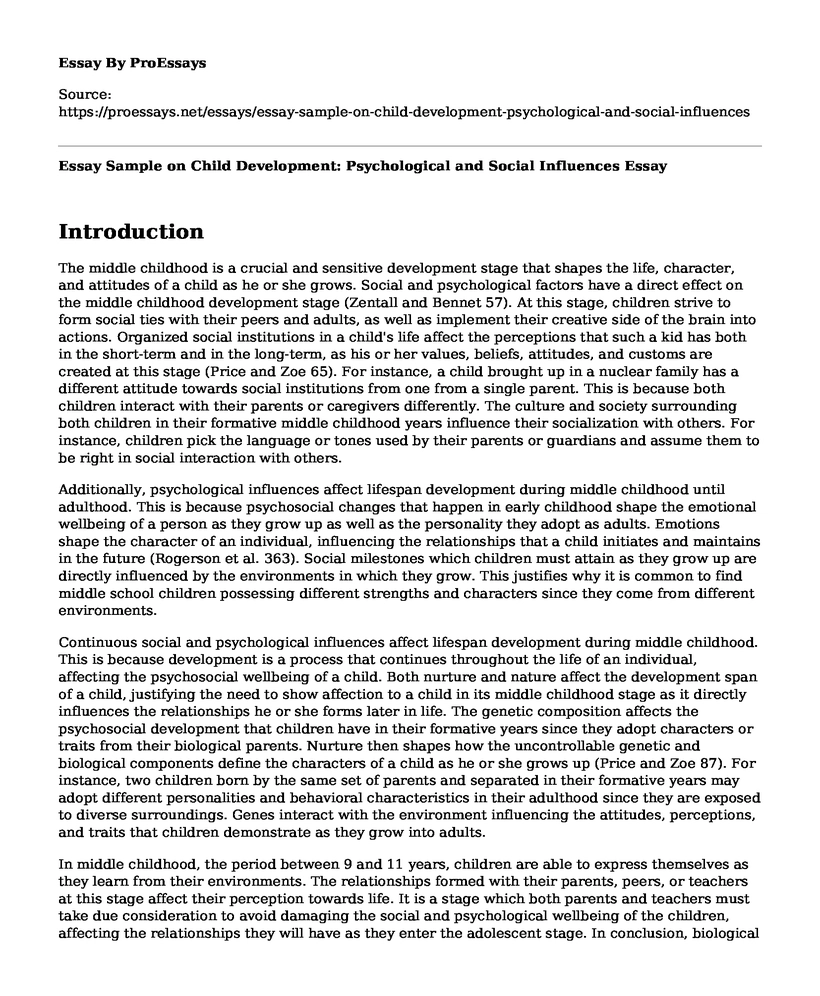Introduction
The middle childhood is a crucial and sensitive development stage that shapes the life, character, and attitudes of a child as he or she grows. Social and psychological factors have a direct effect on the middle childhood development stage (Zentall and Bennet 57). At this stage, children strive to form social ties with their peers and adults, as well as implement their creative side of the brain into actions. Organized social institutions in a child's life affect the perceptions that such a kid has both in the short-term and in the long-term, as his or her values, beliefs, attitudes, and customs are created at this stage (Price and Zoe 65). For instance, a child brought up in a nuclear family has a different attitude towards social institutions from one from a single parent. This is because both children interact with their parents or caregivers differently. The culture and society surrounding both children in their formative middle childhood years influence their socialization with others. For instance, children pick the language or tones used by their parents or guardians and assume them to be right in social interaction with others.
Additionally, psychological influences affect lifespan development during middle childhood until adulthood. This is because psychosocial changes that happen in early childhood shape the emotional wellbeing of a person as they grow up as well as the personality they adopt as adults. Emotions shape the character of an individual, influencing the relationships that a child initiates and maintains in the future (Rogerson et al. 363). Social milestones which children must attain as they grow up are directly influenced by the environments in which they grow. This justifies why it is common to find middle school children possessing different strengths and characters since they come from different environments.
Continuous social and psychological influences affect lifespan development during middle childhood. This is because development is a process that continues throughout the life of an individual, affecting the psychosocial wellbeing of a child. Both nurture and nature affect the development span of a child, justifying the need to show affection to a child in its middle childhood stage as it directly influences the relationships he or she forms later in life. The genetic composition affects the psychosocial development that children have in their formative years since they adopt characters or traits from their biological parents. Nurture then shapes how the uncontrollable genetic and biological components define the characters of a child as he or she grows up (Price and Zoe 87). For instance, two children born by the same set of parents and separated in their formative years may adopt different personalities and behavioral characteristics in their adulthood since they are exposed to diverse surroundings. Genes interact with the environment influencing the attitudes, perceptions, and traits that children demonstrate as they grow into adults.
In middle childhood, the period between 9 and 11 years, children are able to express themselves as they learn from their environments. The relationships formed with their parents, peers, or teachers at this stage affect their perception towards life. It is a stage which both parents and teachers must take due consideration to avoid damaging the social and psychological wellbeing of the children, affecting the relationships they will have as they enter the adolescent stage. In conclusion, biological and environmental factors influence the social and psychological development in the middle childhood stage.
Works Cited
Price, Jennifer C., and Zoe Leviston. "Predicting pro-environmental agricultural practices: the social, psychological and contextual influences on land management." Journal of Rural Studies 34 (2014): 65-78.
Rogerson, Mike, et al. "Influences of green outdoors versus indoors environmental settings on psychological and social outcomes of controlled exercise." International journal of environmental research and public health 13.4 (2016): 363.
Zentall, Thomas R., and Bennet G. Galef Jr, eds. Social learning: Psychological and biological perspectives. Psychology Press, 2013.
Cite this page
Essay Sample on Child Development: Psychological and Social Influences. (2022, Dec 19). Retrieved from https://proessays.net/essays/essay-sample-on-child-development-psychological-and-social-influences
If you are the original author of this essay and no longer wish to have it published on the ProEssays website, please click below to request its removal:
- The Journey That Changed My Life Essay
- Counselling Paper Example
- Research Paper on Pedagogy: Early Childhood Education
- Healthcare And Aging - Essay Sample
- Essay Sample on Pre-Marital Sex: An Ethical Dilemma in Contemporary Society
- Humor: Definition, Nature & Impact on Society - Essay Sample
- Essay Example on Critical Thinking: Activated Ignorance & Intellectual Autonomy







